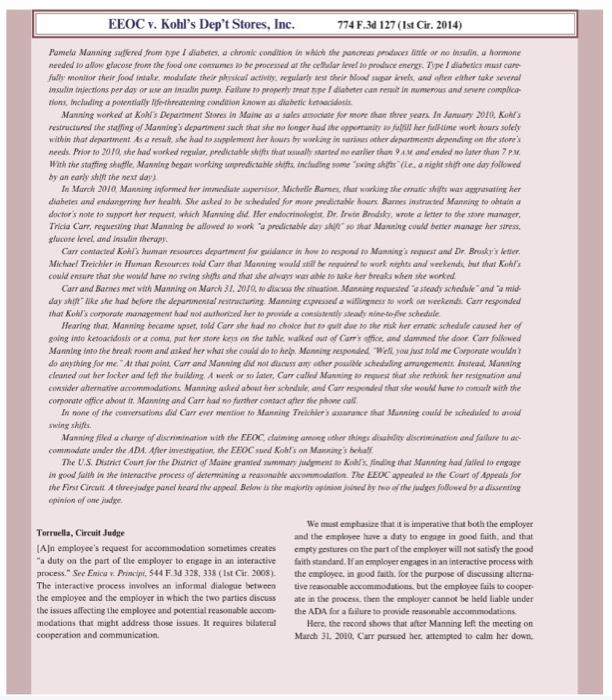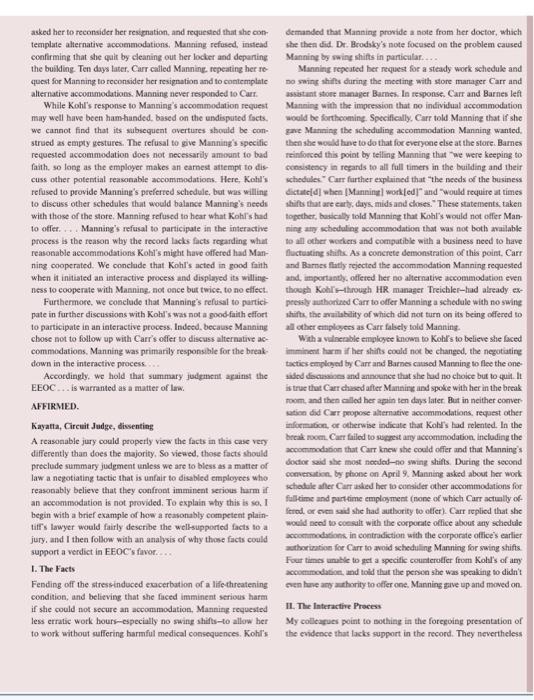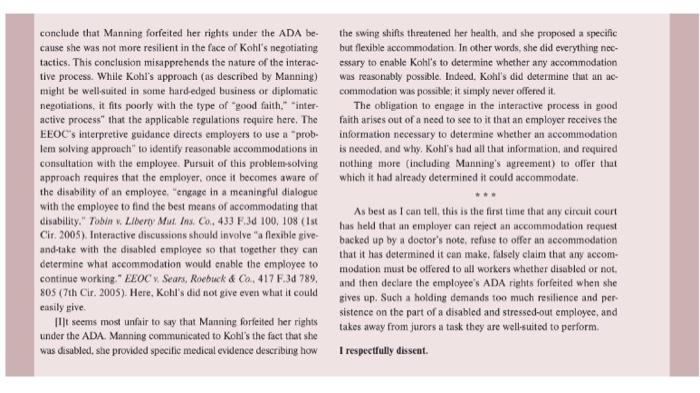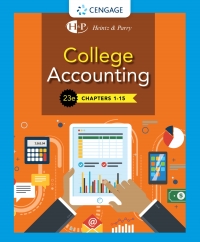Answered step by step
Verified Expert Solution
Question
1 Approved Answer
Write a brief for EEOC V. Khol's Dep't Stores Inc EEOC v. Kohl's Dep't Stores, Inc. 774 F.3d 127 (Ist Cir. 2014) Pamela Manning suffered
Write a brief for EEOC V. Khol's Dep't Stores Inc 


EEOC v. Kohl's Dep't Stores, Inc. 774 F.3d 127 (Ist Cir. 2014) Pamela Manning suffered from Dye I diabetes, chronic condition in which the per produces lake or no insulin hormone needed to allow glucose from the food one come to be processed or the clarire a produce energe. Type I diabetes met care fulle monitor their food male modulate their plecul activity regularly test their blood sugar insandalen eller take several insulin injections per day or use an ancien pump Failure 10 power annat pel diabetes can result in numerous and servere complicar Hones, including a potentially threatening condition known as diabetic acidosis Manning worked at Koht's Department Stores in Malme as a sales anociate for more than three years. In futuary 2010, Kon's Restructured the staffing of Manming's department such that she no longer had the post of her fulle wont hours solely within that department. As a result she had to wplement her hours by working in urnus the departments depending on the store's needs. Prior to M/0, she had worked regular predictables that ally started no earlier there and ended no later than 7 PM With the starting shule Manning began working senpredictable shiftes. Including some swing shijs Vie a night shift one day followed by an early the next day) In March 2010 Manning informed her immediate supervisor Micide Rumes that working she crnutie skift was atriting her diabetes and endangering her health. She asked to be scheduled for more predictable bour Barnes instructed Manning to ahaina doctor's note to support her repuest, whch Manning did. Her endocrinologist Dr. Irete Brodsky, wrote a letter to the store manager Thicle Carr, requesting that Manning be allowed to work a predictable day he to shar Morning could better mange her stress, glucose level and Insular therapy. Cart confected Kohl's human resources department for guidance in how to respond to Maningruit and Dr. Brak eller Michael Trichter in Human Resources told Carr that Mannine would still be mind to work rights and weekends but let Kohl's could ensure that she would me no ung shots and that she was able to make her breaks den she worked Carr and Barnes met with Manning on March 31, 2010. no discsess the situation Manning requested a steady schedule and a mis day si Nike she had before the departmental restructuring. Manning presede willingness to work de weekends Carr responded that Kohl's corporate management had not authorized her to pide a consta in to schedule Hearing that. Manning became upset, told Carr she had no choice but so gut due to the risk her erratic schedule caused her of going into ketoacidosis of a coma, pur her store keys on the table walked out Cares affic and damunted the door Carr followed Manning into the break room and asked her what she could do to helpManni repededWell wrest told me Ciporate would do anything for me. At that point Carr and Mancing did not discuss any other poulde scheiding arrangement instead. Manning daried out her locker and left the building Aneks laterCarr called Maharshereher resignation and consider alternative commandation Manting asked about her handle and Care responded that she would have to cart with the corporate office about it. Manning and Carr had no further contact after the phone call In nevie of the conversations did Carrever mentor no Manning Treichler's awarance that Morning could be scheduled to evol swing shills Manning filed a charge of divination with FEOC dating among other things diashow discrimination and fallure tu de commodate under the ADA. After investigation, the EEDC sed Kohl's on Mamba The U.S. District Court for the District of Maine granted summary judgment Kols, finding thus Manning had failed to engage in good faith in the interactive process of determining u reanimable accommodation The EEOC appealed as the Court of Appeals for the First Circuit. A three yndye panel board the appeal. Below is the majoriy opinion ned by all the judges followed by a dissenting opinion of one judge Torrella, Circuit Judge An employee's request for accommodation sometimes creates "a duty on the part of the employer to engage in an interactive process." See Emicu v. Principe S44 F 34 328, 338( Ixt Cut. 2008). The interactive process involves an informal dialogue between the employee and the employer in which the two parties discuss the issues affecting the employee and potential reasonable accom modations that might address those issues. It requires bilateral cooperation and communication We must emphasize that it is imperative that both the employer and the employee have a daty to engage in good faith, and that empty gestures on the part of the employer will not satisfy the pood faith standard. If an employer engages in an interactive process with the employee. in pood faith. for the purpose of discussing altern- Live reasonable accommodations, but the employee fuils to cooper ate in the process, then the employer cannot be held liable under the ADA for a failure to provide reasonable accommodations Here, the record shows that after Manning left the meeting on March 31. 2010. Curr pursued bec attempted to calm her down. asked her to reconsider het resignation and requested that she con demanded that Manning provide a note from her doctor, which template alternative accommodations. Manning refused, instead she then did. Dt. Brodsky's note focused on the problem caused confirming that she quit by cleaning out her locker and departing Manning by swing shifts in particular.... the building. Ten days later. Carr called Manning, repeating her to Manning repeated her request for a steady work schedule and quest for Manning to reconsider her resignation and to contemplate no swing shifts during the meeting with store manager Carr and alternative accommodations Manning never responded to Carr. assistant store manager Barnes. In response. Carr and Barnes left While Kohl's response to Manning's accommodation request Manning with the impression that no individual accommodation may well have been ham-handed, based on the undisputed facts. would be forthcoming Specifically. Carr told Manning that if she we cannot find that its subsequent overtures should be con e Manning the scheduling accommodation Manning wanted strued as empty gestures. The refusal to give Manning's specific then she would be to do that for everyone else at the store. Bares requested accommodation does not necessardy amount to bad reinforced this point by telling Manning that we were keeping to faith, so long as the employer makes an earnest attempt to dis consistency in regards to all full timers in the building and their cuss other potential reasonable accommodations. Here, Kohl's schedules Carr further explained that the needs of the business refused to provide Manning's preferred schedule, but was willing dictated when Manning worked and would require at times to discuss other schedules that would balance Manning's needs shifts that are carty days. mids and closes. These statements taken with those of the store. Manning refused to hear what Kohl's had together, basically told Manning that Kohl's would not offer Man- to offer... Manning's refusal to participate in the interactive ning any scheduling accommodation that was not both mailable process is the reason why the record lacks facts regarding what to all other workers and compatible with a business need to have reasonable accommodations Kohl's might have offered had Man- fluctuating shifts. As a concrete demonstration of this point, Carr ning cooperated. We conclude that Kohl's acted in good faith and Bames flatly rejected the accommodation Manning requested when it initiated an interactive process and displayed its willing and importantly, offered her no alternative accommodation even ness to cooperate with Manning, not once but twice. to no effect. though Kohl's-through HR manager Treichler-had already ex Furthermore, we conclude that Manning's refusal to partie pressly authorized Carr to offer Manning a schedule with no swing pate in further discussions with Kohl's was not a good-faith effort shifts the wibility of which did not turn on its being offered to to participate in an interactive process. Indeed, because Manning all other employees as Carr falsely told Manning, chose not to follow up with Carr's offer to discuss alternative ac With a vulnerable employce known to Kohl's to believe she faced commodations. Manning was primarily responsible for the break imminent harm if her shifts could not be changed, the negotiating down in the interactive process tacties employed by Care and Barnes Cuised Manning to flee the one Accordingly, we hold that summary judgment against the sided discussions and announce that she had no choice but to quit. It EEOC... is warranted as a matter of law. is true that Carrchased after Manning and spoke with her in the break Toom, and then called her again ten days later. But in neither conver AFFIRMED. sation did Car propose alternative accommodations request other Kayatta, Circuit Judge, dissenting information or otherwise indicate that Kohl's had relented. In the A reasonable jury could properly view the facts in this case very break room. Carr failed to suggest any accommodation, Inc ing the differently than does the majority, So viewed, those facts should accommodation that are knew she could offer and that Manning's preclude summary judgment unless we are to bless as a matter of doctor said she most noda-no swing shifts. During the second law a negotiating tactic that is unfair to disabled employees who conversation by phone on April 9. Manning asked about her work reasonably believe that they confront imminent serious arm if schedule after Carrasked her to consider other accommodations for an accommodation is not provided. To explain why this is so I full-time and part-time employment (none of which Carr actually of begin with a brief example of how a reasonably competent plain- Bered, or even said she had authority to ofer). Carr replied that she tiff's lawyer would fairly describe the well-supported facts to a would need to consult with the corporate office about any schedule jury, and I then follow with an analysis of why those facts could ccommodations in contradiction with the corporate office's earlier support a verdict in EEOC's favor.... authorization for Carr to avoid scheduling Manning for swing shifts Four times unable to get a specific counteroffer from Kohl's of any I. The Facts accommodation, and told that the person she was speaking to didn't Fending off the stress induced exacerbation of a life-threatening een han any authority to offer one. Manning give up and moved on condition, and believing that she faced imminent serious harm if she could not secure an accommodation, Manning requested II. The Interactive Process less erratic work hours-especially no swing shifts-to allow her My colleagues point to nothing in the foregoing presentation of to work without suffering harmful medical consequences. Kohi's the evidence that lacks support in the record. They nevertheless the swing shifts threatened her health, and she proposed a specific but flexible accommodation. In other words, she did everything nee- essary to enable Kohl's to determine whether any accommodation was reasonably possible. Indeed. Kohl's did determine that an ac- commodation was possible; it simply never offered it The obligation to engage in the interactive process in good faith arises out of a need to see to it that an employer receives the information necessary to determine whether an accommodation is needed, and why, Kohl's had all that information, and required nothing more (including Manning's agreement) to offer that which it had already determined it could accommodate conclude that Manning forfeited her rights under the ADA be cause she was not more resilient in the face of Kohl's negotiating tactics. This conclusion misapprehends the nature of the interac- tive process. While Kohl's approuch (as described by Manning) might be well-suited in some hard edged business or diplomatic negotiations, it fits poorly with the type of good faith inter- active process that the applicable regulations require here. The EEOC's interpretive guidance directs employers to use a prob. lem solving approach to identify reasonable accommodations in consultation with the employee. Pursuit of this problem-solving approach requires that the employer, once it becomes aware of the disability of an employee "engage in a meaningful dinlogue with the employee to find the best means of accommodating that disability." Tobin Lller Mut. Inx. Co 433 F.3d 100, 108 (Ist Cir. 2005). Interactive discussions should involve "a flexible give and-take with the disabled employee so that together they can determine what accommodation would enable the employee to continue working." EEOCSears, Roebuck & Co. 417 5.34 789. 805 (7th Cir. 2005). Here, Koll's did not give even what it could easily give IIt seems most unfair to say that Manning forfeited her rights under the ADA. Manning communicated to Kohl's the fact that she was disabled, she provided specific medical evidence describing how As best as I can tell, this is the first time that any circuit court has held that an employer can reject an accommodation request backed up by a doctor's note, refuse to offer an accommodation that it has determined it can make, falsely claim that any accom- modation must be offered to all workers whether disabled or not. and then declare the employee's ADA rights forfeited when she gives up. Such a holding demands too much resilience and per sistence on the part of a disabled and stressed-out employee, and takes away from jurors a task they are well-suited to perform I respectfully dissent 


Step by Step Solution
There are 3 Steps involved in it
Step: 1

Get Instant Access to Expert-Tailored Solutions
See step-by-step solutions with expert insights and AI powered tools for academic success
Step: 2

Step: 3

Ace Your Homework with AI
Get the answers you need in no time with our AI-driven, step-by-step assistance
Get Started


